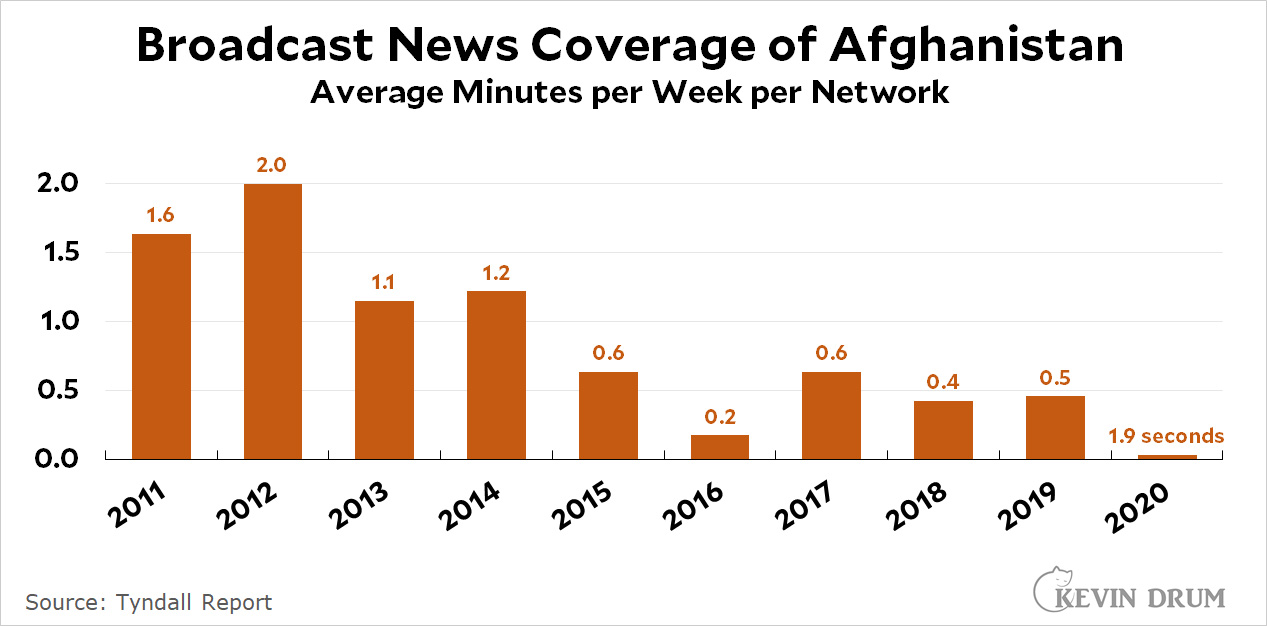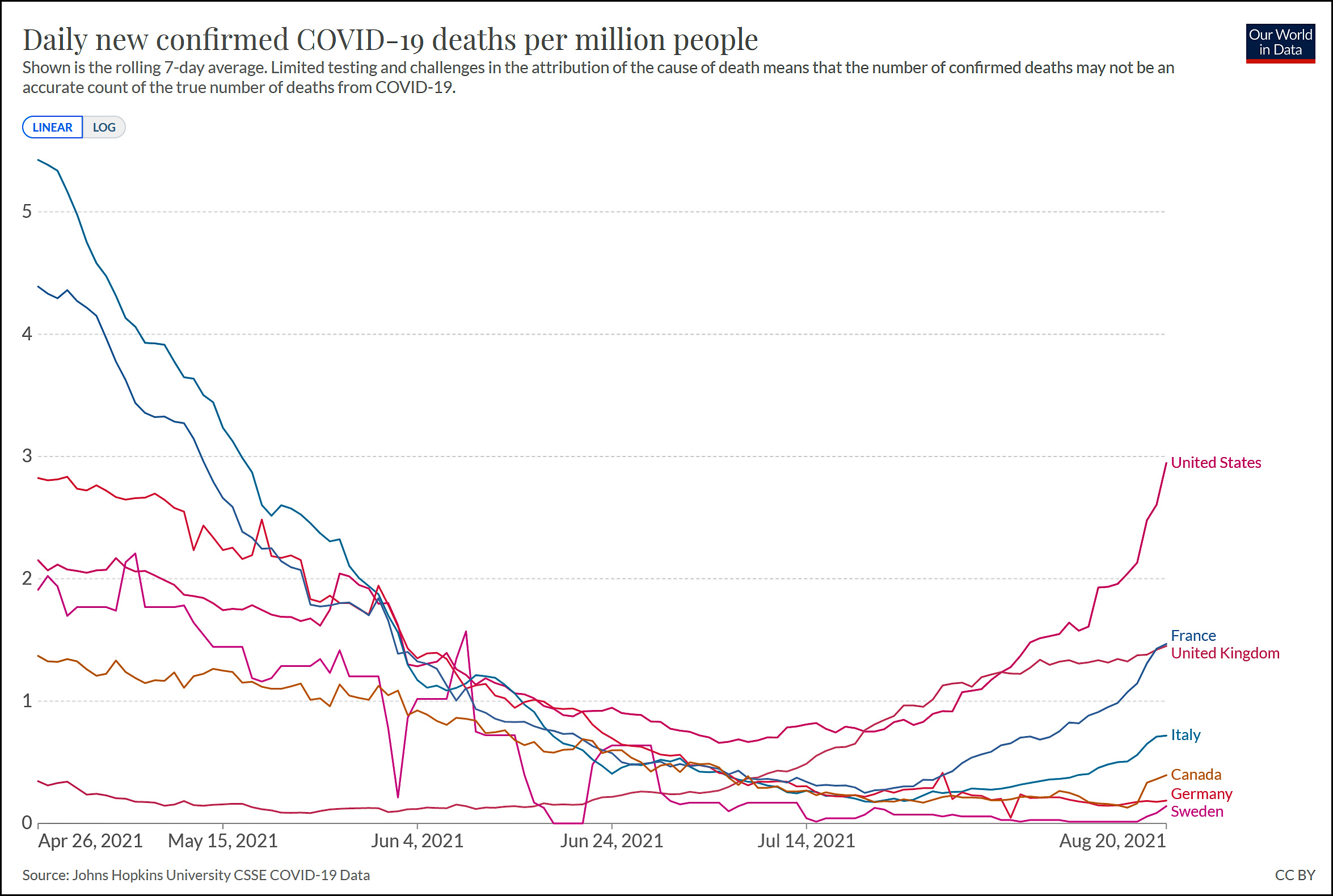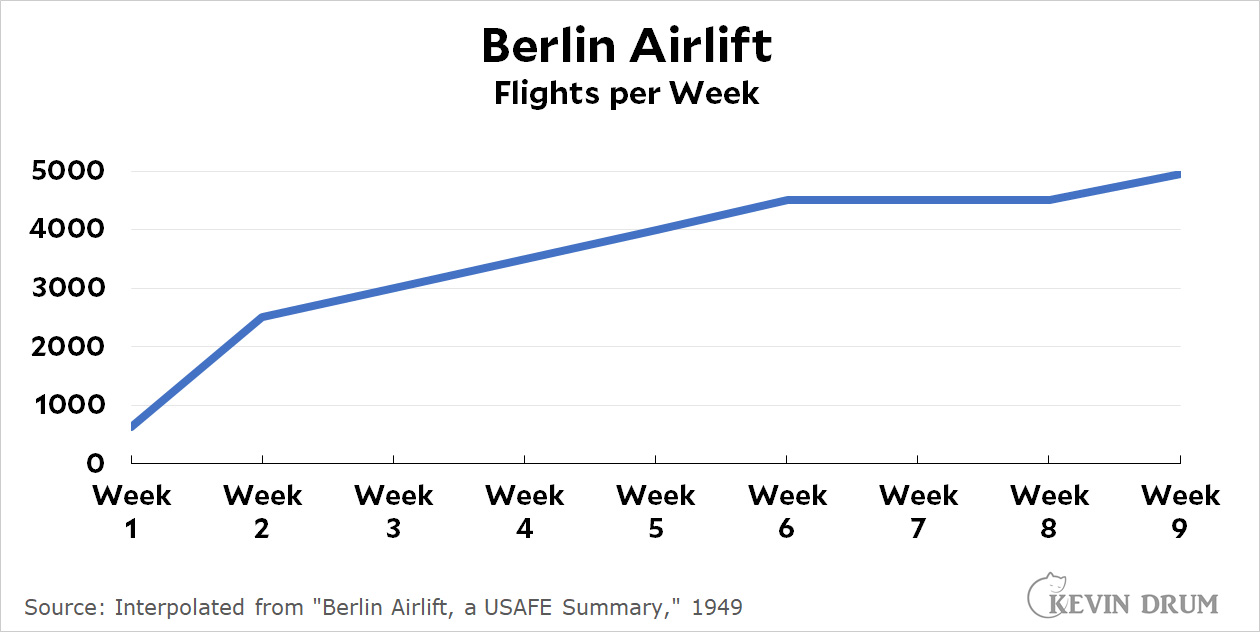NEW: Between 3:00am and 3:00pm ET today, a total of approximately 10,900 people were evacuated from Kabul.
In total, the U.S.-led mission has facilitated the evacuation of 48,000 people since August 14.
— Mike Gwin (@MGwin46) August 23, 2021
Lunchtime Photo
This is a photo of St. Peter's Square about half an hour after sunrise, looking east from the steps of the basilica. I deliberately underexposed it by about a stop to produce a more dramatic look.
Which worked out fine. It's a nice picture. Somehow, though, it reminds me of a set from HBO's Rome, though I'm not sure why. Maybe because it's almost completely empty?

Chart of the day: Broadcast news coverage of Afghanistan
Via Jim Lobe, here is the coverage of Afghanistan by broadcast news shows over the past decade:

If you're wondering why this matters, it's simple: no president is going to admit that his Afghanistan policies are likely to lead to tens of thousands of Afghans desperately trying to leave the country when the Taliban takes over. Not Trump, not Biden, not any of them. It's the press that should fill that void, warning viewers that a pullback by the US will almost certainly lead to a Taliban takeover and the evacuation of the country.
Instead, we got almost nothing until the very last weeks of the withdrawal. As a result, the chaos on Monday took everyone by surprise and produced a tsunami of panicked hot takes. If reporting had been better, more people would have been prepared for this and Monday's brief panic wouldn't have instantly congealed into a badly misguided conventional wisdom.
Oh well. Bygones.
Pfizer vaccine gets full FDA approval
The Food and Drug Administration on Monday granted full approval to Pfizer-BioNTech’s coronavirus vaccine for people 16 and older, making it the first to move beyond emergency use status in the United States.
The decision will set off a cascade of vaccine requirements by hospitals, colleges, corporations and other organizations. United Airlines recently announced that its employees will be required to show proof of vaccination within five weeks of regulatory approval.
Oregon has adopted a similar requirement for all state workers, as have a host of universities in states from Louisiana to Minnesota. The Pentagon has said it would mandate the shots for the country’s 1.3 million active-duty troops once the Pfizer approval came through.
In one sentence we learn that full approval will set off a "cascade" of vaccine requirements, but in the very next sentence we learn that loads of organizations have already put them in place.
So which is it? Is full approval needed for vaccine requirements to be approved? Or can everyone do it regardless of the vaccine's status? Seems like the latter to me, but what do I know?
POSTSCRIPT: And how is Fox News taking this? Until today, the party line was that the vaccine was still "experimental" because it had only emergency approval. Today, they're reporting that "critics" are wondering if the FDA rushed the full approval for political reasons. Just asking questions here!
Kabul evacuation is up to 35,000
Earlier Sunday, the White House said the U.S. had evacuated 7,800 people from Kabul in the previous 24 hours. Later Sunday evening, the White House added another 5,100 to the day’s total of evacuees. In all, the U.S. has evacuated 30,300 people in the past week, a White House official said. Since the end of July, about 35,500 people have been evacuated from Kabul.
A gunbattle broke out early Monday at Kabul’s airport, killing at least one Afghan soldier, with the security situation deteriorating as the U.S. and its Western allies consider extending an evacuation operation that has been engulfed in chaos for more than a week....No injuries to American and German soldiers were reported.
The firefight underscored the challenges facing the U.S. and its partners in Afghanistan as the Biden administration considers whether to extend the evacuation program past a deadline it has set for Aug. 31. It has pledged to end those efforts and withdraw all U.S. troops from Afghanistan by then.
The Taliban insists that the US keep to its August 31 deadline, which it calls a "red line." Staying beyond the deadline "will provoke a reaction," their spokesman said on Monday.
The biggest military evacuation in US history is going pretty well
I have had it with coverage of the Kabul evacuation. The plain fact is that, under the circumstances, it's going fairly well. Both Americans and Afghan allies are being flown out safely and bloodshed on the ground is surprisingly limited. Sure, the whole operation is going to take a few weeks, but what did everyone expect?
But you'd never know this thanks to an immense firehose of crap coming from the very people we should least believe. This includes:
- The hawks who kept the war in Afghanistan going for years with lies and happy talk, and who are now desperate to defend themselves.
- Republicans who figure this is a great opportunity to sling partisan bullshit. Their favorite is that Biden has destroyed America's standing in the world, an old chestnut for which there's no evidence whatsoever.
- Trumpies trying to avoid blame for the execution of their own plan. It is gobsmacking to hear them complain about slow processing of Afghan allies when they were the ones who deliberately hobbled the visa process in the first place.
- Democrats who, as usual, are too damn cowardly to defend the withdrawal for fear of—something. It's not always clear what.
- Reporters who are sympathetic to all this because they genuinely care about the danger that the withdrawal poses for people they knew in Afghanistan.
The only real mistake the military made in this operation was in not realizing just what a terrible job they had been doing all along. Everything else flows from that. If the Afghan government had been able to hold off the Taliban for even a few weeks, everything would have been fine. But they didn't even try. Ghani just grabbed a few suitcases of cash and took off.
All by itself, this should tell you how hopeless the situation in Afghanistan has been all along. After 20 years, the Afghan military, even with plenty of warning about when we planned to leave, was unable, and in many cases unwilling, to fight. It's laughable to think that another few months would have made any difference. It's equally laughable to hear from the "light footprint" gang, who think that we could have kept a few thousand troops in Afghanistan forever and avoided any kind of fighting even after the Taliban cease-fire was over.
As for all the Americans being airlifted out, I suppose it's bad form to point out that they were told to leave months ago? If they had a lick of common sense most of them wouldn't be stuck in Kabul and elsewhere waiting to be rescued.
The sophisticated attitude these days is to say that, of course, we needed to leave Afghanistan, but surely we could have executed the withdrawal more competently? Maybe, but I'd like to hear the plan. The problems we've run into were baked into the cake long ago, and the actual evacuation itself has been run with courage and guts. "There's a whole nother story line that media could follow," Cheryl Rofer says. "The people who are working to keep the flights running, the people who get on the flights, the people who are helping others to get to the airport, the people who are running the logistics."
Amen to that. This is by far the biggest military evacuation in US history, and it's being handled surprisingly well. Maybe that will change tomorrow. Anything could happen. But so far the US media has been suckered into a narrative that's almost precisely the opposite of the truth. It needs to stop.
Here’s the COVID-19 mortality rate in seven countries
The death rate from COVID-19 keeps going up and up in the United States and shows no sign of slowing down. It doesn't have to be this way, of course. These are deaths of choice.

Can we evacuate 100,000 people by the end of August?
During its first week, the Kabul evacuation averaged about 4,000 people a day, reaching a total of just over 20,000 by Friday.
According to the White House, there are still about 80,000 people left to go—including both US citizens and Afghan allies—and the Air Force has a goal of increasing its capacity to 9,000 people per day. If they meet that goal, the airlift will be finished in about nine days, or August 29.
Is this increase from 4,000 to 9,000 feasible? Sure. Here's a rough look at the Berlin Airlift in 1948:

The first week was full of snags and ended up completing only 630 flights. The second week was four times higher, completing about 2,500 flights.
Needless to say, these two airlifts aren't strictly comparable. The Berlin airlift was for supplies, not people, and relied on planes with far less capacity than the C-17s used today. Still, the point here is a universal one: the first few days of nearly any operation are full of problems. Once those are sorted out, efficiency rises very quickly.
I doubt that we'll really be done by August 29. I think the Air Force is up to the job, but toward the end of next week we'll probably run into bottlenecks that have nothing to do with airlift capacity. Still, even if we're not completely done by then I'll bet we'll be 95% done by the end of the month. We'll see.
More than 20,000 people have been evacuated from Kabul
By the way, as of Friday we have evacuated more than 20,000 people from Kabul and are evacuating more at the rate of about 4-5,000 per day.
How much freedom did Biden have to time the evacuation of Kabul?
A friend of mine sent me Andrew Sullivan's latest essay on Afghanistan and it was about what you'd expect: The withdrawal is a clusterfuck, but President Biden deserves credit for sticking to his guns and getting us out anyway.
However, I was struck by this line, which I've seen in lots of places over the past few days:
Of course, we should have gotten our people out before the Taliban’s imminent victory — all the Americans and every single Afghan who helped us. That we didn’t is horrifying. To contemplate this betrayal is to shudder.
I'm not going to pretend that I know anything about the logistics of a large-scale evacuation under military pressure, but I do wonder if the people saying stuff like this have really thought it through.
Here's the reality: Initially, Biden had no choice except to express confidence in the Afghan government and its military. Anything else really would have been a profound betrayal. But the moment he started a panicked evacuation of American and Afghan personnel, the jig was up. That would be an unmistakable signal not just that we were serious about withdrawing, but that we no longer had any confidence in the ability of Ghani and the Afghan military to hold off the Taliban. The collapse of the country would have followed within a day or two, no matter when Biden started the evacuation.
This is meant as neither criticism nor defense of Biden. It's just the way things are. I'm not sure he had nearly as much freedom of action as people think he did.
